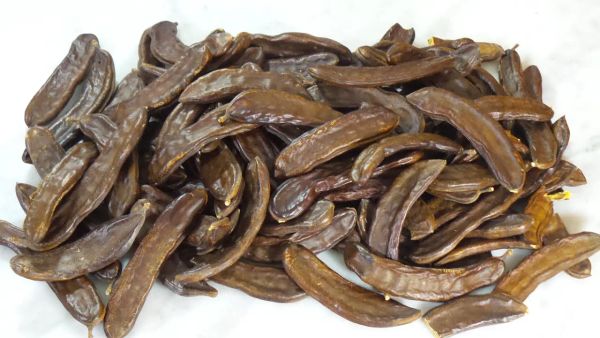
In the world of healthy foods, there are hidden gems that often go unnoticed. Let’s shine a spotlight on one of these forgotten treasures: carob. This ancient fruit is packed with remarkable nutritional properties that can support your overall well-being. Although carob has been overshadowed in recent years, its numerous health benefits make it worth rediscovering.
Uncovering the Origins and Appearance of Carob
Carob, scientifically known as Ceratonia siliqua, is the fruit of the carob tree. This tree, belonging to the Fabaceae family, originates from the Mediterranean region and parts of Western Asia. With a preference for warm climates, carob has been cultivated for thousands of years.
Carob fruit resembles a long, pod-shaped bean. Inside the pod, you’ll find a sweet and fibrous pulp that surrounds several hard seeds. Traditionally, carob was cherished as a sweetener and a snack, especially during times of scarcity. Today, it’s regaining attention for its impressive nutritional profile and health benefits.
Exploring the Nutritional Value of Carob
Carob is a nutritional powerhouse, packed with essential nutrients that contribute to overall health. Some key nutrients found in carob include:
- Vitamin B: Supports metabolism and energy production
- Calcium: Essential for strong bones and teeth
- Iron: Helps prevent iron deficiency anemia
- Magnesium: Regulates muscle and nerve function
- Potassium: Maintains normal blood pressure
- Zinc: Strengthens the immune system
In addition to these vitamins and minerals, carob is also a rich source of dietary fiber, protein, and antioxidants. This makes it a truly nutritious addition to any diet.
The Health Benefits of Carob
Carob offers a wide range of benefits that can positively impact your well-being. Let’s take a closer look at some of the key ways carob can improve your health:
1. Aiding Digestive Health
Carob is fantastic for digestion, thanks to its high fiber content. Fiber plays a critical role in improving intestinal regularity, preventing constipation, and promoting overall digestive health. By consuming carob regularly, you can maintain a healthy digestive system, ensure proper waste elimination, and reduce the likelihood of gastrointestinal discomfort.
2. Supporting Weight Management
Carob is a great ally in managing weight. Its fiber content promotes a feeling of fullness, which can help reduce appetite and prevent overeating. This makes carob an ideal food for those looking to manage their weight or prevent obesity. By incorporating carob into your diet, you can feel satisfied without consuming excess calories.
3. Promoting Heart Health
Carob is naturally cholesterol-free and high in potassium, a mineral known for its ability to lower blood pressure. By helping regulate blood pressure levels, carob contributes to maintaining heart health and reducing the risk of cardiovascular diseases. Its fiber content also plays a role in lowering harmful cholesterol levels, making it an excellent food for promoting a healthy heart.
4. Strengthening the Immune System
Packed with antioxidants, carob, especially polyphenols, helps protect your cells from oxidative stress caused by free radicals. These antioxidants strengthen the immune system, reducing the risk of infections and diseases. By consuming antioxidant-rich foods like carob, you can improve your body’s defenses and stay healthier overall.
5. Supporting Cholesterol Control
Carob contains soluble fiber, known to help lower LDL (bad) cholesterol levels. This is crucial for maintaining cardiovascular health and reducing the risk of heart disease. Regular consumption of carob can naturally support your cholesterol levels, making it a heart-healthy choice.
6. A Rich Source of Essential Nutrients
Carob is a nutrient-dense fruit, particularly rich in calcium and iron. Calcium is vital for bone health, helping prevent conditions like osteoporosis, while iron is essential for producing healthy red blood cells and preventing anemia. Including carob in your diet ensures you’re getting these critical nutrients that are often lacking in modern diets.
How to Enjoy Carob
Carob is a versatile fruit that can be easily incorporated into your diet. Here are some popular methods of enjoying carob:
- Whole Carob Pods: The dried pods can be eaten as a sweet, chewy snack or added to recipes for a boost of flavor and nutrition.
- Carob Powder: Ground carob is often used as a substitute for cocoa powder. It’s naturally sweet and caffeine-free, making it a great alternative to chocolate for those who are sensitive to caffeine or want a healthier option. Carob powder can be used in baking, smoothies, and even homemade desserts.
- Carob Syrup: In some cultures, carob syrup is used as a natural sweetener in beverages and recipes, offering a healthier alternative to refined sugar.
With its mild and sweet flavor, carob is an ideal ingredient for baked goods, energy bars, and snacks. Whether you use it as a snack or an ingredient in recipes, carob offers an easy way to add nutrition and flavor to your meals.
Rediscovering Carob for Modern Diets
As we search for healthier food options, carob provides a wonderful opportunity to reintroduce a natural and nutritious ingredient that has been used for centuries. With its many health benefits, including aiding digestion, promoting heart health, and supporting weight management, carob is an excellent addition to a balanced diet. Its versatility in cooking and baking makes it easy to incorporate into your everyday meals.
Conclusion
Carob is an ancient fruit with incredible health benefits that deserve recognition in modern diets. From supporting digestive health and weight management to lowering cholesterol and boosting the immune system, carob is indeed a nutritional powerhouse. So, the next time you’re looking for a healthy, natural option, consider adding carob to your diet and experience the benefits for yourself.



